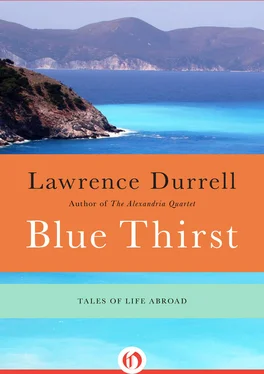I should perhaps say a few words about the functions of embassies and the role they play; in our crazy spy-mad age the whole question of information has been much bedevilled by the fact that all information of whatever kind has been lumped together by the spy-nuts behind the Curtain and made to sound as if it were military in scope. This is plain madness. When an embassy is appointed to a country it is perfectly normal for them to find out what is going on there, what personalities rule there, in the simple interests of business or cultural association. Of course when some countries are acting in bad faith and with bad intent their consciences prick them for they know that they are building a secret army or secret airforce and they don’t want the fact known. But the whole domain of commercial and cultural relations is helped or hindered by the knowledge of a good embassy. They study the produce of the country and put people in their own country in touch so that business deals can be arranged. They send poets and journalists and painters on short visits. They arrange for painting or films to be shown reciprocally. All this is for the best, and only in this lunatic age would it be thought of as spying. But when countries have something to hide, particularly the communist countries, and you get a spy phobia, it’s very amusing to see what is regarded as spying: all these legitimate activities which in peace time or under normal diplomatic arrangements wouldn’t be considered at all reprehensible, but in fact helpful information. For example, here I wouldn’t have to bug you for information about silkworms or about San Francisco wines; I would just ring up the board of trade and go out and get all the information I needed and send it home clear, not in cipher. Whereas, half the trouble with this problem is that what is not really spying is considered spying. For example, I spent 4½ years in Yugoslavia for my sins; that was tough. There everything was considered spying, even breathing. When you arrived at the gate you practically have a man to breathe for you, to breathe down you and on you. And when you went to the embassy he breathed on your car, and when you came out he followed in another car. And then there was a man in your house who breathed on you too. That’s how I’m so good at yoga now because I learned breathing from the secret police there. But it was perfectly foolish also, because the amount of information you can get if you really want to out of censored papers is absolutely marvellous if you know a little bit of Freud, a little bit of crossword puzzle, a little bit of this and that. The military attaché used to have great fun because he could read Yugoslav, and reading the official communiques he could follow the movements of their units of the army all over the town. For example, the artillery was largely horse-drawn, so every time they arrived in a village they put an ad in the local paper asking for farriers to shoe their horses. Thus we always knew the 37th division was at this particular place because we used to buy all the papers, even the provincial ones. I mean, if they force you to work you can really find almost anything with a bit of logic and intuition. Meanwhile, they used to do silly things. They used to put microphones in the bowl of roses on your table. Whereupon we would tape the noise of lavatory chains and fill their mikes with long long strips of water music. We played this lavatory chains noise for hours to their mikes until they got tired and moved them.
All that’s the rather futile and foolish end of diplomacy, but the serious end is fascinating, and it is interesting and it can be fruitful. As I say, acted on in good faith, it can be enormously useful between nations. It’s a pity that communications have rendered it rather suspect and rather moribund because a great personality is still a great negotiator; and I have seen even very silly personalities — I would describe Sir Anthony Eden as rather a fop, but he’s an extraordinarily good negotiator — and I saw him locking horns with a trade delegation in Yugoslavia and he was extremely bright. I wouldn’t have suspected it from his political role. And then of course we had other problems because half the world is ruled by nuts as you probably know. Or do you know?
And then the evaluation of a very trick position between church and state, for example, in Egypt. In the middle of the war — the Egyptians had declared war but they didn’t want to fight — they declared war because we asked them to. So we allowed them to man the anti-aircraft defenses of Cairo and Alexandria, which they did with considerable skill, but technically they were out of the war, so that their towns were not bombed, they were open cities. Now Farouk was a strangely divided character, very strange. On one hand rather civilised, on the other hand seething with Arab resentments, and like anyone who’s been to British public school, pretty scratched up. It was even dues what he might elect to do. While we were fighting the Germans in the desert we couldn’t really risk a political situation on an Arab basis in Egypt where, for example, the anti-aircraft defenses of Cairo might be withdrawn suddenly. It was not that the defenses themselves were so terribly important, but the towns would’ve been bombed and then the Egyptians would have panicked and we would have had an interior situation which would have benefited Rommel very much indeed. As it was, by a stroke of luck and a fluke, and some diplomacy, and the use of one tank it was stabilized. They went late one night and broke down the palace wall and told Farouk that he really must appoint Nahas Pasha who was pro-British and able to stabilize the situation. And he did do that, but he didn’t like doing it at all and it was, I suppose, a bit of a fascist act. But he had no choice. We had to do that because at one point the Germans were 40 kilometers away and it was quite clear Rommel was going to reach Cairo that evening.
At this time I was attached to the British Embassy and was as usual pining for an independent command. I was always complaining about being under other peoples’ orders. I was extremely independent and had a number of bad ideas which now, looking back, I am rather glad they didn’t let me put into action. But one of the great tragedies in my life has been that whenever I did get an independent command it was in a situation which had gone too far, had deteriorated into a crisis post. I arrived in Yugoslavia on the night Tito broke with Stalin. The frontiers were humming with tanks. Then again when I got a post in Cyprus the whole island went up under me, so to speak. Well, in Egypt, when I finally did get my independent command, it was I think because they thought I would arrive in Alexandria and find a German sitting in my office chair. They realized that the only man crazy enough to accept such an appointment was Durrell. Why not give Durrell to the Germans? He was not much use to us and could do us little harm if they took him away. But I was so fed up with Cairo that I thought I would take a chance. So I drew a revolver which I only knew how to fire very vaguely, and climbed into the night train for the coast. It was all blacked out, very sinister; and from time to time there were halts, mysterious unexplained halts, in the desert; everything went dead silent. Only giant mosquitoes filled the carriages, biting us to death. When I arrived in my post Rommel was still 40 kilometres away; his troops had got bogged down in a bottleneck of sand dunes and lakes called the Qattara Depression. I couldn’t believe my luck.
In Alexandria everything was shut up. When there’s an element of panic in the air the first sign you notice is all the cafés close and all the delicatessens and everything like that, and they roll down those iron shutters; and the more intelligent had actually put up signs saying “Welcome to Rommel” in German. Well, I went around and made a complete list of these people. It took me about three hours and then I went to the British H.Q. and said, “If Rommel doesn’t arrive tonight, these people are going to be out of bounds to British troops, I assure you.” And the Army agreed and they stayed out of bounds for four months. Finally, I had delegations of these people coming to my office and pleading to be put back on the visitor’s list because after Rommel was repulsed and the British got back into Alexandria these people found the British soldiers couldn’t drink in these places. It was out of bounds for them. So this was the only practical thing I could do in the way of propaganda. I made a lot of friends this way.
Читать дальше












